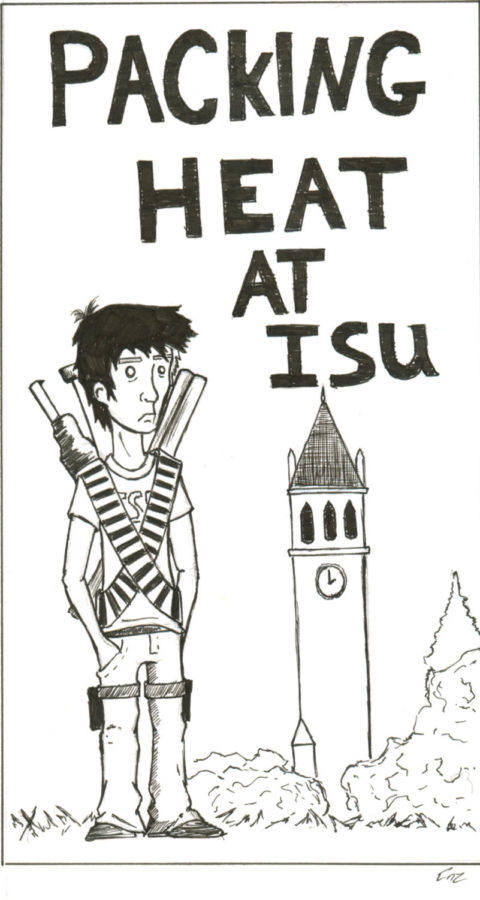Students up in arms over gun laws
Illustration: Eric Ensey/Iowa State Daily
Packing Heat Illustration
February 10, 2011
The nation watched closely as the people of Tucson, Ariz., suffered through a shooting that not only ended in six people killed and 12 wounded, but with a debate about gun rights that can be felt on the ISU campus.
Last semester, a new student organization, Students for Concealed Carry on Campus, was started by Anthony Taylor, junior in software engineering, as a way to change the ISU policy on weapons. ISU policy reads, “Weapons are not permitted on the campus except for purposes of law enforcement and as specifically authorized for purposes of instruction, research or service.”
Students for Concealed Carry on Campus is a national organization that began shortly after the Virginia Tech shooting in 2007 and is now found on many campuses across the United States. The group is a “national, non-partisan, grass-roots organization composed of more than 43,000 college students, professors, college employees, parents of college students and concerned citizens,” according to its website.
After approaching Eric Cooper, associate professor of psychology, about advising Students for Concealed Carry on Campus, Taylor began the process of approval and recruitment. With only seven members, a constitution yet to be approved and no set meetings, the club has a long road ahead of it, but that doesn’t keep members from setting goals.
“All we’re talking about is changing the fact that people who are allowed to defend themselves anywhere else in the state are allowed to do so when going to class,” Taylor said. “It’s really more about the precaution.”
Students for Concealed Carry on Campus has two key goals, according to the organization’s national website. The first is to work with state legislators and school administrators to allow college students the right to carry concealed on campus. The second is to educate the public in order to dispel the everyday myths and misconceptions traditionally associated with concealed carry on campus.
“What I’ve found is the majority of people just haven’t made a decision on the issue because they don’t know enough about it,” Taylor said. “So educating the public would be the best thing.”
Group members participate in one annual event April 4. Students nationwide wear an empty holster to class to further raise awareness on what they are trying to achieve.
The arrival of a group advocating these changes to campus life has created a cause for concern for several members of the ISU community.
“I think that if people started carrying concealed weapons on campus, the atmosphere of campus will change to one where people are fearful and suspicious of other people,” said Stephanie Madon, associate professor of psychology. “I think the potential for harm is much greater than any benefit we could ever possibly hope to get out of students carrying concealed weapons on campus.”
Many researchers have studied violence or violent behaviors and have found theories that could be applied to concealed carry on campus.
“In social psychology, there’s this very robust effect called the weapons effect, which is a tendency for people to behave aggressively when they are in the presence of a weapon,” Madon said. “Based on the evidence I’m familiar with, I do not think that having more guns on campus, being carried by students, is going to reduce violence.”
However, some say the exact opposite.
“Of all the campuses that do allow campus carry, there hasn’t been a single incident where there’s been an act of violence involving guns,” Taylor said. “People who have bad intentions are going to do it anyway. A rule doesn’t stop them. All it does is disarm the people who have no intention of breaking the law.”
Whether students agree with the goals set by Students for Concealed Carry on Campus, the group must first go through the proper channels to discuss the possible changes. This means talking to school administrators who might think that these changes are unnecessary and possibly dangerous.
“It could potentially get out of hand, and I think we really need to leave it to the trained law enforcement officials to deal with that,” said Thomas Hill, vice president for Division of Student Affairs.
“I think we have a tremendous response time and I think the campus is a safe campus,” he said. “There’s a reason we send law enforcement officers to the academy. They are trained in more than just weapon safety and operation. When you deal with criminal behavior, there are just so many other things involved in that.”
New legislation in both the Iowa Senate and the Iowa House has added fuel to the fire while also creating some confusion.
Senate File 2379 went into effect Jan. 1 and changed the current law by making the ability to obtain a permit more uniform throughout the entire state. Sheriffs are no longer allowed as much discretion as before, but instead must assess an applicant according to a preset list of conditions. This also allows for administrative and judicial review for any permit denials or suspensions.
“Parts of that legislation may raise the question of whether current university restrictions on the carrying and possession of firearms are still valid, and the university’s position is ‘yes,'” said Jerry Stewart, director of ISU Public Safety. “Those are still valid and they still prohibit the possession or use of weapons, including firearms, pursuant to Iowa Administrative Code and University policy.”
“The enactment of this law provides an excellent opportunity to communicate to our community members what regulations are in place so that through education, faculty, staff, students or visitors won’t unknowingly violate the law or policies,” Stewart said.







